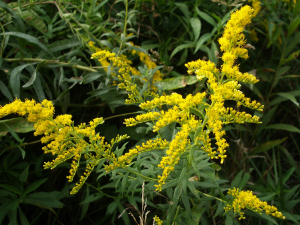 Inulin is a soluble dietary fibre that is a naturally occurring oligosaccharide (simple sugars that are linked together). This oligosaccharide belongs to a group of carbohydrates called fructans. Inulin is a special type of carbohydrate because it is non-digestible yet it is very important to our health. The benefit to inulin is that it passes through the small intestinal tract and ferments in the large intestine. The fermentation process allows the inulin to become healthy intestinal micro flora (aka bifidobacterium). Bifidobacterium is a probiotic that is critical to our health.
Inulin is a soluble dietary fibre that is a naturally occurring oligosaccharide (simple sugars that are linked together). This oligosaccharide belongs to a group of carbohydrates called fructans. Inulin is a special type of carbohydrate because it is non-digestible yet it is very important to our health. The benefit to inulin is that it passes through the small intestinal tract and ferments in the large intestine. The fermentation process allows the inulin to become healthy intestinal micro flora (aka bifidobacterium). Bifidobacterium is a probiotic that is critical to our health.
Benefits of Bifidobacterium
Researchers have fervently pursued the probiotic benefits of bifidobacterium over the past ten to fifteen years. They have found out that bifidobacterium exist in a healthy digestive system. Since 2006, researchers from the University of Manchester School of Medicine have been extensively studying this probiotic and have discovered many positives. For example, breast-fed babies have a higher level of bifidobacterium than babies who are fed formula.
Interestingly, the number of bifidobacteria actually declines in the human body with age so it becomes very important to make sure you are getting probiotics.
There are many sub-strains of bifidobacterium and one of these is called Bifidobacterium bifidum. B. bifidum attach to cells of the intestine and protect the physical lining of your intestine against damage from toxins or germs. This keeps toxins and germs out of your blood and prevents them from making you sick or disrupting cellular function and it stimulates your immune system. In addition, probiotics like B. bifidum also produce important vitamins like B12, biotin, and K2.
Recent research shows that bifidobacterium reduces the incidence of colds and flu.
Be warned though, B. bifidum levels will drastically decrease if you consume foods that contain pesticides, foods with artificial sugars, and antibiotics. When bad bacteria outnumbers the good then your intestinal tract will react by causing Crohn’s, intestinal motility (diarrhea, constipation, spastic colitis), and diverticulitis.
Adding Probiotics Into Your Diet
There has been an awareness for several years about getting more probiotics into our diet. The crazy thing is that many people are unaware as to why having probiotics is essential. Bottom line, gut health is critical to overall good health and to the health of our brain as well. UCLA researchers discovered that changing the bacterial environment in the gut can affect the brain as well so this is even more reason to be taking care of our gut bacteria levels.
There have been no studies comparing store-bought foods with wild edibles and it would be interesting to know which is healthier. Of course fermented foods are well-known to be an amazing way to increase probiotics as well as yogurt and cheese.
Inulin occurs naturally in the roots of many wild edible plants. Chicory is perhaps the most well-known of the wild plants for inulin content. However, there are many other plants that can provide us with inulin in their roots such as: burdock, goldenrod, dandelion, Jerusalem artichoke, wild asparagus, salsify, Canada thistle, common camas (not the death camas) and balsamroot.
In their raw form they are not too palatable so the best way to take advantage of this free inulin is by making vinegar using organic apple cider vinegar. Collect some fresh roots, clean them, then cut them up and place into a glass container. Fill the jar with the apple cider vinegar and let sit (away from sunlight) for at least a month. Apple cider vinegar on its own provides us with inulin so imagine all the probiotics you’ll get with this vinegar. Use on a salad or add a few teaspoons into your water to enjoy the health benefits.
The rewards of having bifidobacterium are many and it is important to ensure that your body is getting all the sub-strains of bifidobacterium into your daily diet. Why not add the roots of those wild plants with inulin into your diet. After all, the Hadza’s (the last known indigenous hunter-gatherers in north-central Tanzania) are living proof that wild plants are invaluable to living a healthy life.




Thanks! This is very interesting. I like the idea of eating wild plants because you are more likely to pick up some soil-based bacteria, such as Bacillus subtilis, with them. In addition to bifidobacterium, these spore forming bacteria are very important.
Hi Sally, I love your comment. Soil based bactera ia so important to us and the plants we grow for food. If any one has an answer to the following question, please email a reply to [email protected]
Do you know of a way to transplant these soil-based bacteria?
My property was so over sprayed with RoundUp by the previous owner that there aren’t even any worms in certain areas of the property. I have been here for 7 years, now and it is just now beginning to grow weeds again. I would love to help culture bacteria that is known to be a healing bacteria, like: Streptomyces sp. myrophore. Any ideas?
Great post
How interesting! What a unique new way to get probiotics! Very cool, thank you for sharing!
The author explain about the how important the wild plants and their roots for living a healthy life. really i learn a lot and try to apply in my daily routine life
Very interesting post. Very cool, thanks for sharing. Well explained and informative post